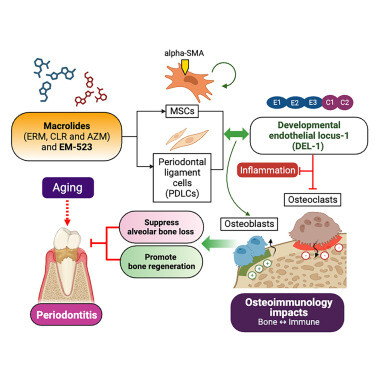The tested macrolides included antibiotics erythromycin, clarithromycin, and azithromycin and a non-antibiotic macrolide, but not rapamycin, which is also a macrolide.
https://www.cell.com/iscience/fulltext/S2589-0042(24)00019-1
If this effect holds for rapamycin, wouldn’t that be the first non-mTOR target for the drug?

8 Likes
If the effect does hold for rapamycin (along with the macrolides they tested) then maybe it is the mechanism behind this result (which has been discussed here and by M. Kaeberlein) “Rapamycin rejuvenates oral health in aging mice”:
6 Likes
Good find! Yes - that would explain those results (and even more reasons to try rapamycin toothpaste 
Highlights
-
Macrolides and EM-523 increase DEL-1 in the gingiva and periodontium of aged mice
-
Macrolides and EM-523 promote bone regeneration in old age
-
Macrolides and EM-523 suppress osteoclastogenesis in vivoand in vitro
-
Macrolides and EM-523 induces osteogenesis in vivo and in vitro
and as you said:
Rapamycin (sirolimus) is a macrolide immunosuppressant that inhibits the mechanistic target of rapamycin (mTOR) protein kinase and extends lifespan in model organisms including mice.
Source: Rapamycin: An InhibiTOR of Aging Emerges From the Soil of Easter Island - PMC.
3 Likes
